APN Capstone Portfolio Part Two: Advanced Practice Nursing Concepts
VerifiedAdded on 2023/04/21
|23
|5479
|354
Portfolio
AI Summary
This document presents an APN (Advanced Practice Nursing) capstone portfolio, focusing on the demonstration of professional growth and expertise through various exemplars. The portfolio addresses program outcomes such as advocating for positive health outcomes, cultural humility, care-focused practice, holistic health and patient-centered care, and professional identity. Each exemplar includes an explanation of how the outcome was met, relevant MSN (Master of Science in Nursing) essentials, NONPF (National Organization of Nurse Practitioner Faculties) core competencies, identified concepts, and personal reflections on the learning experience. Specific examples include diagnosing a patient with cold-like symptoms using evidence-based data, developing an APN professional development plan, utilizing clinical guidelines for hemodialysis nurses, implementing patient-centered care principles during clinical rotation, and creating a care plan for a patient with diabetes using the SOAP method. The portfolio aims to synthesize knowledge, promote reflective thought, and provide evidence of meeting assignment, course, and program learning outcomes.
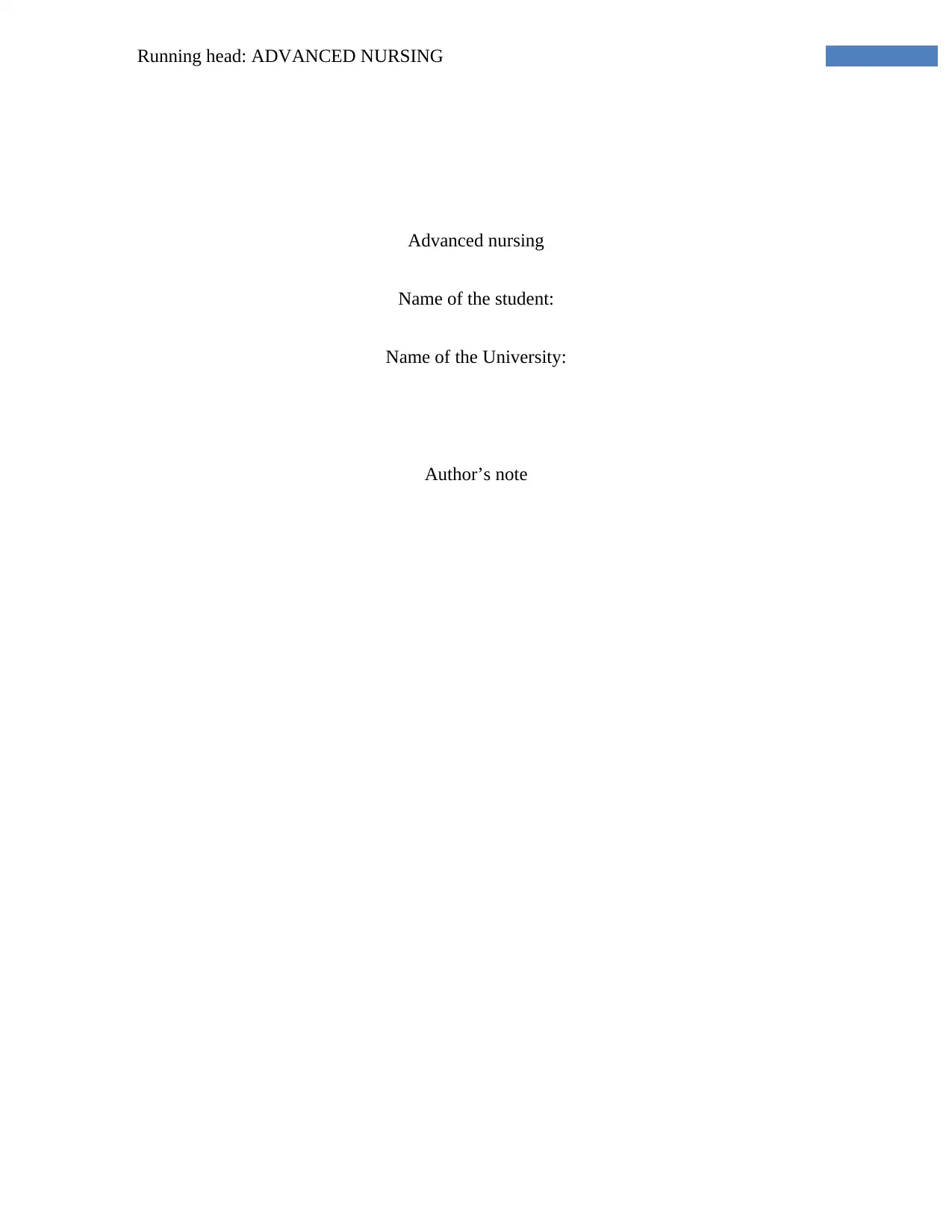
Running head: ADVANCED NURSING
Advanced nursing
Name of the student:
Name of the University:
Author’s note
Advanced nursing
Name of the student:
Name of the University:
Author’s note
Paraphrase This Document
Need a fresh take? Get an instant paraphrase of this document with our AI Paraphraser
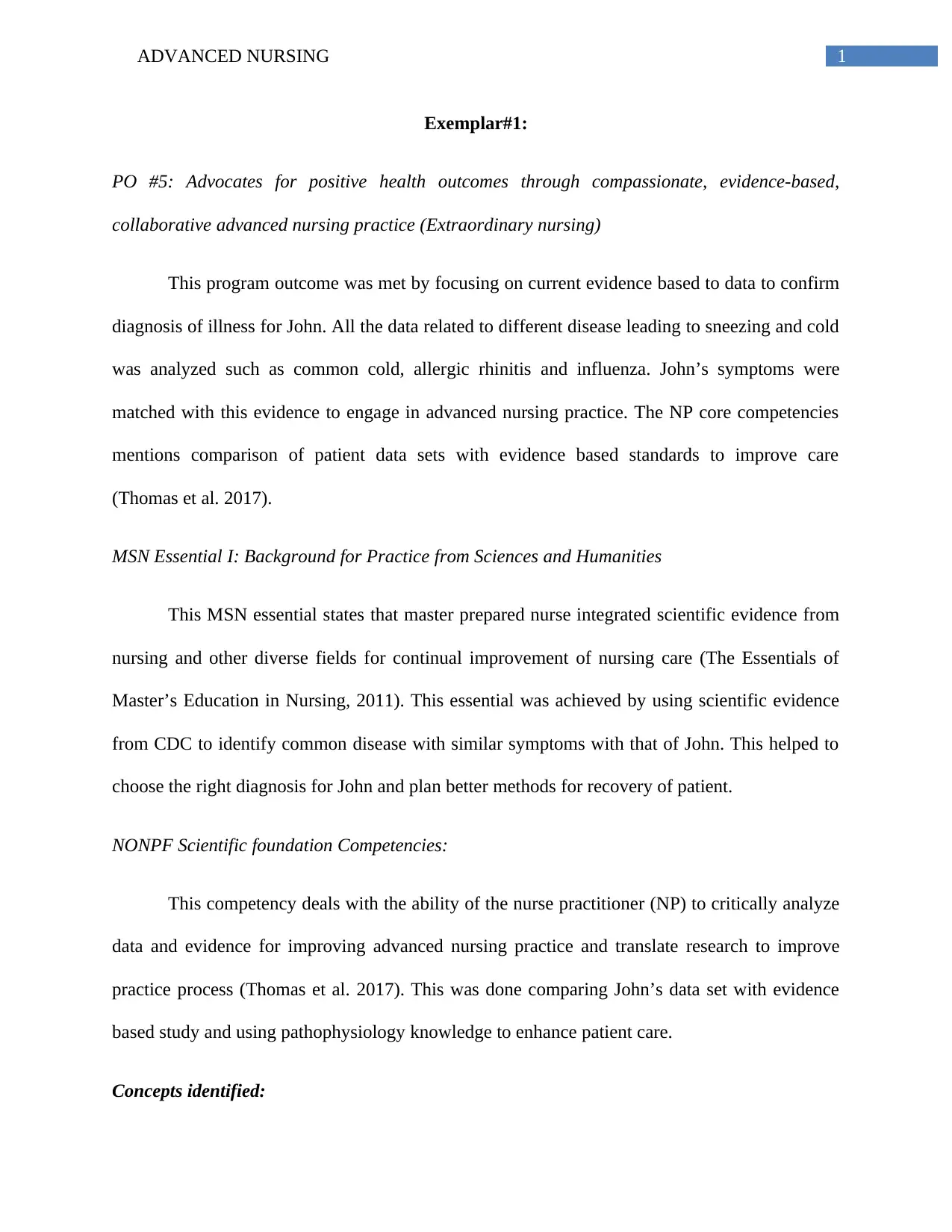
1ADVANCED NURSING
Exemplar#1:
PO #5: Advocates for positive health outcomes through compassionate, evidence-based,
collaborative advanced nursing practice (Extraordinary nursing)
This program outcome was met by focusing on current evidence based to data to confirm
diagnosis of illness for John. All the data related to different disease leading to sneezing and cold
was analyzed such as common cold, allergic rhinitis and influenza. John’s symptoms were
matched with this evidence to engage in advanced nursing practice. The NP core competencies
mentions comparison of patient data sets with evidence based standards to improve care
(Thomas et al. 2017).
MSN Essential I: Background for Practice from Sciences and Humanities
This MSN essential states that master prepared nurse integrated scientific evidence from
nursing and other diverse fields for continual improvement of nursing care (The Essentials of
Master’s Education in Nursing, 2011). This essential was achieved by using scientific evidence
from CDC to identify common disease with similar symptoms with that of John. This helped to
choose the right diagnosis for John and plan better methods for recovery of patient.
NONPF Scientific foundation Competencies:
This competency deals with the ability of the nurse practitioner (NP) to critically analyze
data and evidence for improving advanced nursing practice and translate research to improve
practice process (Thomas et al. 2017). This was done comparing John’s data set with evidence
based study and using pathophysiology knowledge to enhance patient care.
Concepts identified:
Exemplar#1:
PO #5: Advocates for positive health outcomes through compassionate, evidence-based,
collaborative advanced nursing practice (Extraordinary nursing)
This program outcome was met by focusing on current evidence based to data to confirm
diagnosis of illness for John. All the data related to different disease leading to sneezing and cold
was analyzed such as common cold, allergic rhinitis and influenza. John’s symptoms were
matched with this evidence to engage in advanced nursing practice. The NP core competencies
mentions comparison of patient data sets with evidence based standards to improve care
(Thomas et al. 2017).
MSN Essential I: Background for Practice from Sciences and Humanities
This MSN essential states that master prepared nurse integrated scientific evidence from
nursing and other diverse fields for continual improvement of nursing care (The Essentials of
Master’s Education in Nursing, 2011). This essential was achieved by using scientific evidence
from CDC to identify common disease with similar symptoms with that of John. This helped to
choose the right diagnosis for John and plan better methods for recovery of patient.
NONPF Scientific foundation Competencies:
This competency deals with the ability of the nurse practitioner (NP) to critically analyze
data and evidence for improving advanced nursing practice and translate research to improve
practice process (Thomas et al. 2017). This was done comparing John’s data set with evidence
based study and using pathophysiology knowledge to enhance patient care.
Concepts identified:
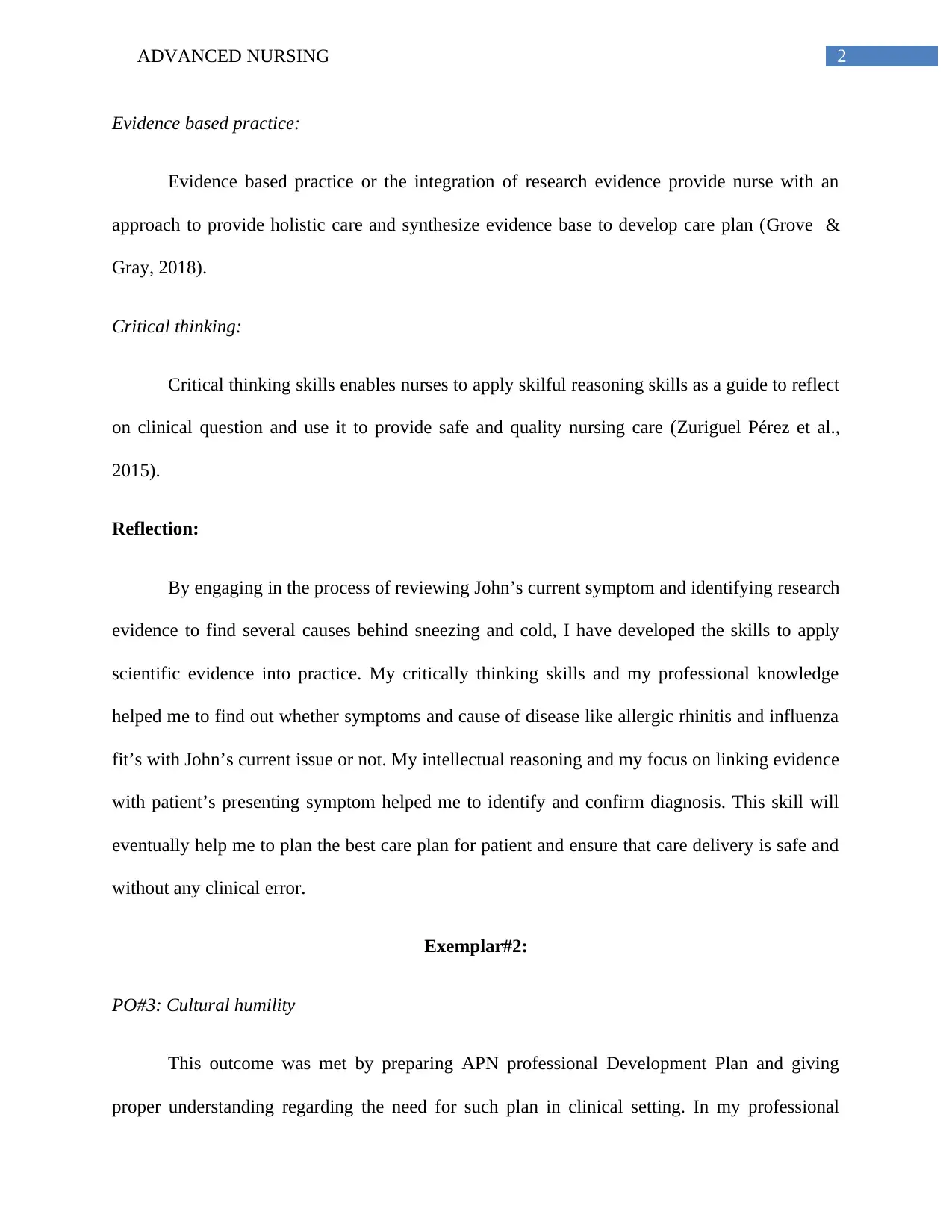
2ADVANCED NURSING
Evidence based practice:
Evidence based practice or the integration of research evidence provide nurse with an
approach to provide holistic care and synthesize evidence base to develop care plan (Grove &
Gray, 2018).
Critical thinking:
Critical thinking skills enables nurses to apply skilful reasoning skills as a guide to reflect
on clinical question and use it to provide safe and quality nursing care (Zuriguel Pérez et al.,
2015).
Reflection:
By engaging in the process of reviewing John’s current symptom and identifying research
evidence to find several causes behind sneezing and cold, I have developed the skills to apply
scientific evidence into practice. My critically thinking skills and my professional knowledge
helped me to find out whether symptoms and cause of disease like allergic rhinitis and influenza
fit’s with John’s current issue or not. My intellectual reasoning and my focus on linking evidence
with patient’s presenting symptom helped me to identify and confirm diagnosis. This skill will
eventually help me to plan the best care plan for patient and ensure that care delivery is safe and
without any clinical error.
Exemplar#2:
PO#3: Cultural humility
This outcome was met by preparing APN professional Development Plan and giving
proper understanding regarding the need for such plan in clinical setting. In my professional
Evidence based practice:
Evidence based practice or the integration of research evidence provide nurse with an
approach to provide holistic care and synthesize evidence base to develop care plan (Grove &
Gray, 2018).
Critical thinking:
Critical thinking skills enables nurses to apply skilful reasoning skills as a guide to reflect
on clinical question and use it to provide safe and quality nursing care (Zuriguel Pérez et al.,
2015).
Reflection:
By engaging in the process of reviewing John’s current symptom and identifying research
evidence to find several causes behind sneezing and cold, I have developed the skills to apply
scientific evidence into practice. My critically thinking skills and my professional knowledge
helped me to find out whether symptoms and cause of disease like allergic rhinitis and influenza
fit’s with John’s current issue or not. My intellectual reasoning and my focus on linking evidence
with patient’s presenting symptom helped me to identify and confirm diagnosis. This skill will
eventually help me to plan the best care plan for patient and ensure that care delivery is safe and
without any clinical error.
Exemplar#2:
PO#3: Cultural humility
This outcome was met by preparing APN professional Development Plan and giving
proper understanding regarding the need for such plan in clinical setting. In my professional
⊘ This is a preview!⊘
Do you want full access?
Subscribe today to unlock all pages.

Trusted by 1+ million students worldwide
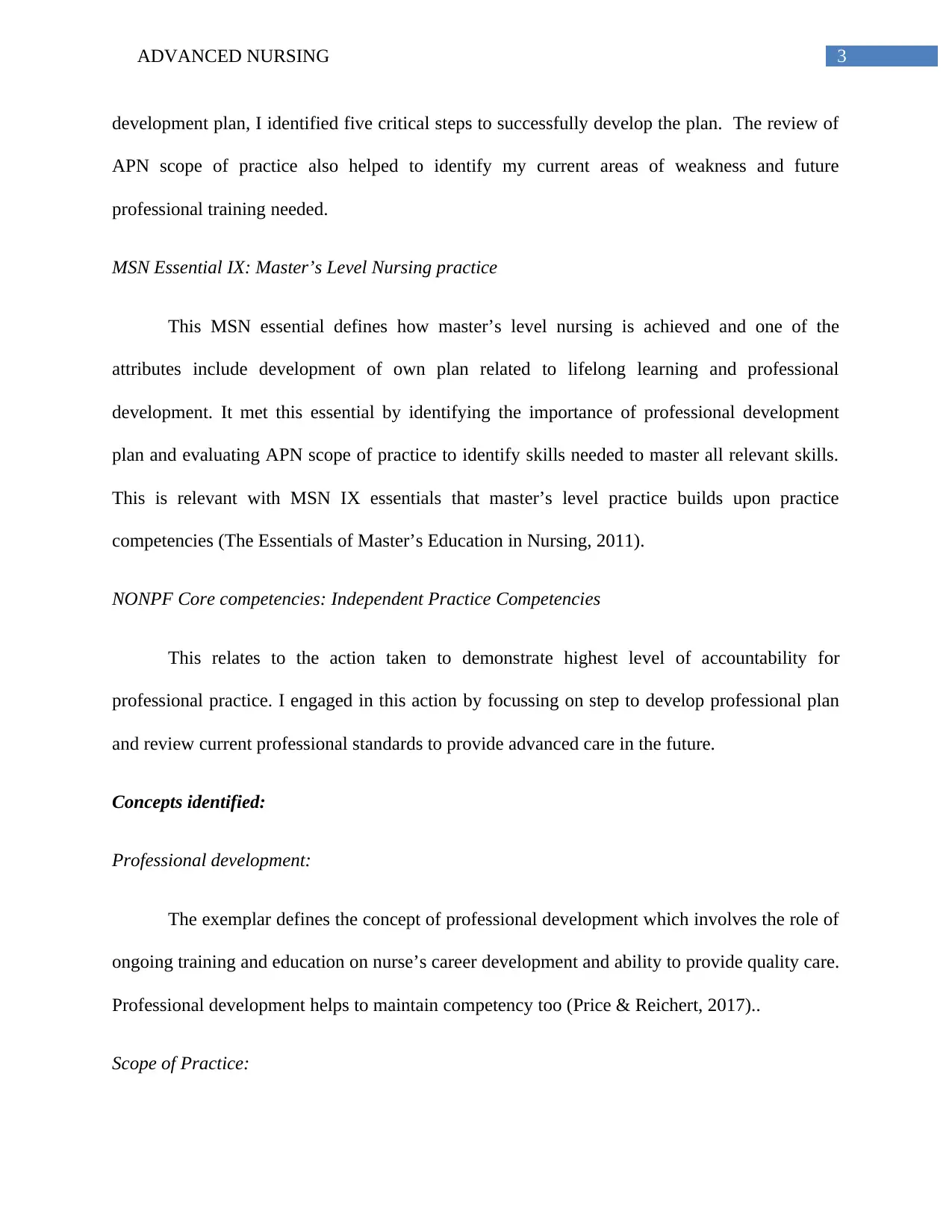
3ADVANCED NURSING
development plan, I identified five critical steps to successfully develop the plan. The review of
APN scope of practice also helped to identify my current areas of weakness and future
professional training needed.
MSN Essential IX: Master’s Level Nursing practice
This MSN essential defines how master’s level nursing is achieved and one of the
attributes include development of own plan related to lifelong learning and professional
development. It met this essential by identifying the importance of professional development
plan and evaluating APN scope of practice to identify skills needed to master all relevant skills.
This is relevant with MSN IX essentials that master’s level practice builds upon practice
competencies (The Essentials of Master’s Education in Nursing, 2011).
NONPF Core competencies: Independent Practice Competencies
This relates to the action taken to demonstrate highest level of accountability for
professional practice. I engaged in this action by focussing on step to develop professional plan
and review current professional standards to provide advanced care in the future.
Concepts identified:
Professional development:
The exemplar defines the concept of professional development which involves the role of
ongoing training and education on nurse’s career development and ability to provide quality care.
Professional development helps to maintain competency too (Price & Reichert, 2017)..
Scope of Practice:
development plan, I identified five critical steps to successfully develop the plan. The review of
APN scope of practice also helped to identify my current areas of weakness and future
professional training needed.
MSN Essential IX: Master’s Level Nursing practice
This MSN essential defines how master’s level nursing is achieved and one of the
attributes include development of own plan related to lifelong learning and professional
development. It met this essential by identifying the importance of professional development
plan and evaluating APN scope of practice to identify skills needed to master all relevant skills.
This is relevant with MSN IX essentials that master’s level practice builds upon practice
competencies (The Essentials of Master’s Education in Nursing, 2011).
NONPF Core competencies: Independent Practice Competencies
This relates to the action taken to demonstrate highest level of accountability for
professional practice. I engaged in this action by focussing on step to develop professional plan
and review current professional standards to provide advanced care in the future.
Concepts identified:
Professional development:
The exemplar defines the concept of professional development which involves the role of
ongoing training and education on nurse’s career development and ability to provide quality care.
Professional development helps to maintain competency too (Price & Reichert, 2017)..
Scope of Practice:
Paraphrase This Document
Need a fresh take? Get an instant paraphrase of this document with our AI Paraphraser
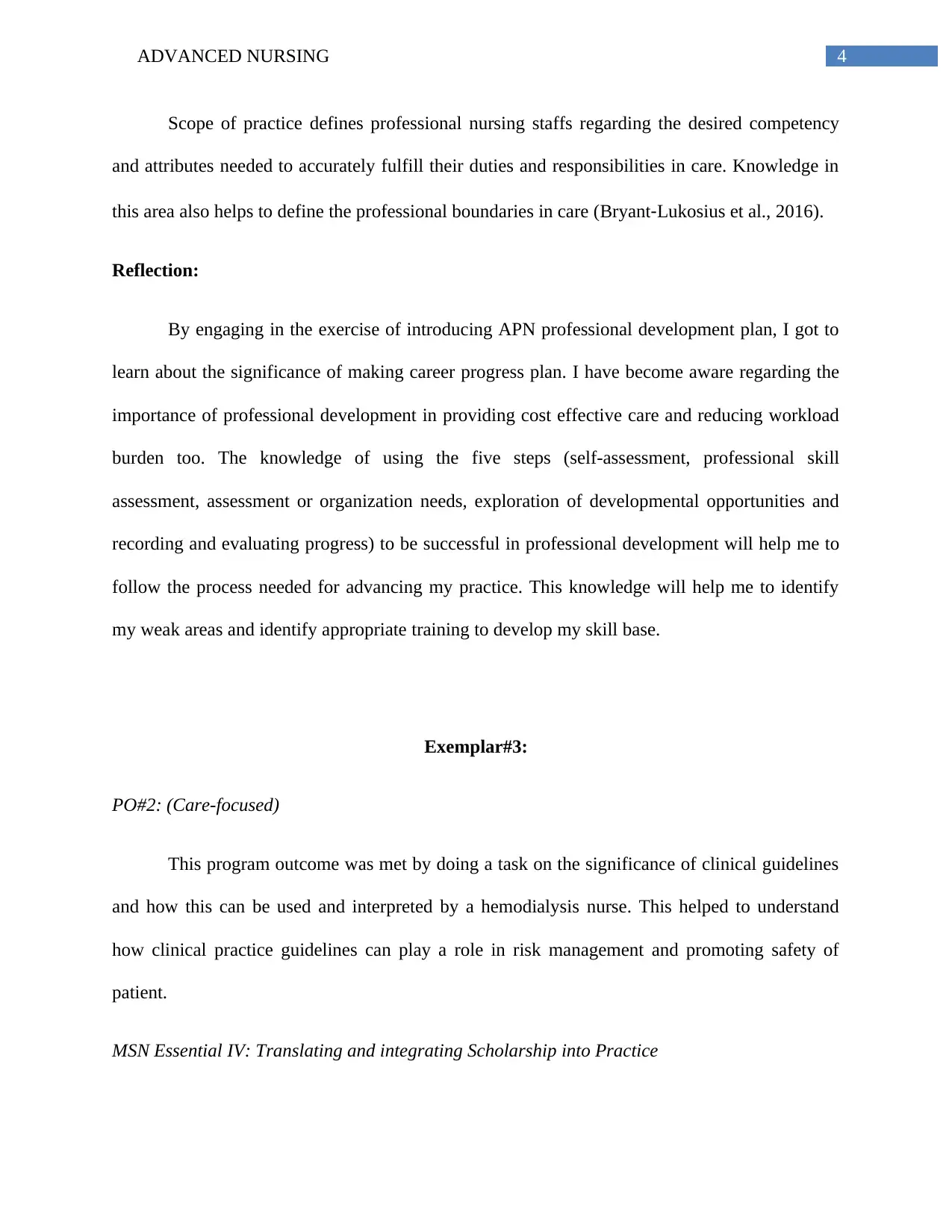
4ADVANCED NURSING
Scope of practice defines professional nursing staffs regarding the desired competency
and attributes needed to accurately fulfill their duties and responsibilities in care. Knowledge in
this area also helps to define the professional boundaries in care (Bryant‐Lukosius et al., 2016).
Reflection:
By engaging in the exercise of introducing APN professional development plan, I got to
learn about the significance of making career progress plan. I have become aware regarding the
importance of professional development in providing cost effective care and reducing workload
burden too. The knowledge of using the five steps (self-assessment, professional skill
assessment, assessment or organization needs, exploration of developmental opportunities and
recording and evaluating progress) to be successful in professional development will help me to
follow the process needed for advancing my practice. This knowledge will help me to identify
my weak areas and identify appropriate training to develop my skill base.
Exemplar#3:
PO#2: (Care-focused)
This program outcome was met by doing a task on the significance of clinical guidelines
and how this can be used and interpreted by a hemodialysis nurse. This helped to understand
how clinical practice guidelines can play a role in risk management and promoting safety of
patient.
MSN Essential IV: Translating and integrating Scholarship into Practice
Scope of practice defines professional nursing staffs regarding the desired competency
and attributes needed to accurately fulfill their duties and responsibilities in care. Knowledge in
this area also helps to define the professional boundaries in care (Bryant‐Lukosius et al., 2016).
Reflection:
By engaging in the exercise of introducing APN professional development plan, I got to
learn about the significance of making career progress plan. I have become aware regarding the
importance of professional development in providing cost effective care and reducing workload
burden too. The knowledge of using the five steps (self-assessment, professional skill
assessment, assessment or organization needs, exploration of developmental opportunities and
recording and evaluating progress) to be successful in professional development will help me to
follow the process needed for advancing my practice. This knowledge will help me to identify
my weak areas and identify appropriate training to develop my skill base.
Exemplar#3:
PO#2: (Care-focused)
This program outcome was met by doing a task on the significance of clinical guidelines
and how this can be used and interpreted by a hemodialysis nurse. This helped to understand
how clinical practice guidelines can play a role in risk management and promoting safety of
patient.
MSN Essential IV: Translating and integrating Scholarship into Practice
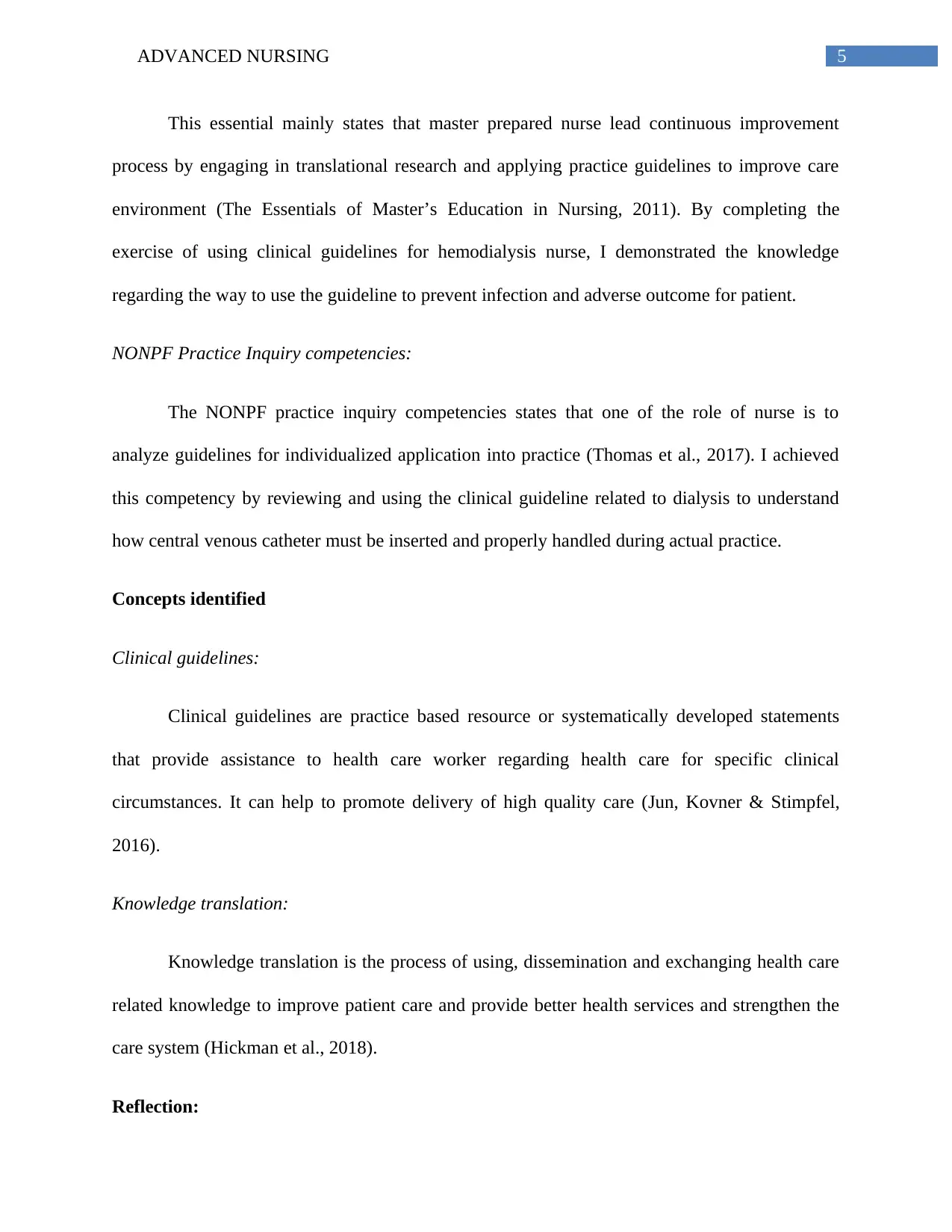
5ADVANCED NURSING
This essential mainly states that master prepared nurse lead continuous improvement
process by engaging in translational research and applying practice guidelines to improve care
environment (The Essentials of Master’s Education in Nursing, 2011). By completing the
exercise of using clinical guidelines for hemodialysis nurse, I demonstrated the knowledge
regarding the way to use the guideline to prevent infection and adverse outcome for patient.
NONPF Practice Inquiry competencies:
The NONPF practice inquiry competencies states that one of the role of nurse is to
analyze guidelines for individualized application into practice (Thomas et al., 2017). I achieved
this competency by reviewing and using the clinical guideline related to dialysis to understand
how central venous catheter must be inserted and properly handled during actual practice.
Concepts identified
Clinical guidelines:
Clinical guidelines are practice based resource or systematically developed statements
that provide assistance to health care worker regarding health care for specific clinical
circumstances. It can help to promote delivery of high quality care (Jun, Kovner & Stimpfel,
2016).
Knowledge translation:
Knowledge translation is the process of using, dissemination and exchanging health care
related knowledge to improve patient care and provide better health services and strengthen the
care system (Hickman et al., 2018).
Reflection:
This essential mainly states that master prepared nurse lead continuous improvement
process by engaging in translational research and applying practice guidelines to improve care
environment (The Essentials of Master’s Education in Nursing, 2011). By completing the
exercise of using clinical guidelines for hemodialysis nurse, I demonstrated the knowledge
regarding the way to use the guideline to prevent infection and adverse outcome for patient.
NONPF Practice Inquiry competencies:
The NONPF practice inquiry competencies states that one of the role of nurse is to
analyze guidelines for individualized application into practice (Thomas et al., 2017). I achieved
this competency by reviewing and using the clinical guideline related to dialysis to understand
how central venous catheter must be inserted and properly handled during actual practice.
Concepts identified
Clinical guidelines:
Clinical guidelines are practice based resource or systematically developed statements
that provide assistance to health care worker regarding health care for specific clinical
circumstances. It can help to promote delivery of high quality care (Jun, Kovner & Stimpfel,
2016).
Knowledge translation:
Knowledge translation is the process of using, dissemination and exchanging health care
related knowledge to improve patient care and provide better health services and strengthen the
care system (Hickman et al., 2018).
Reflection:
⊘ This is a preview!⊘
Do you want full access?
Subscribe today to unlock all pages.

Trusted by 1+ million students worldwide
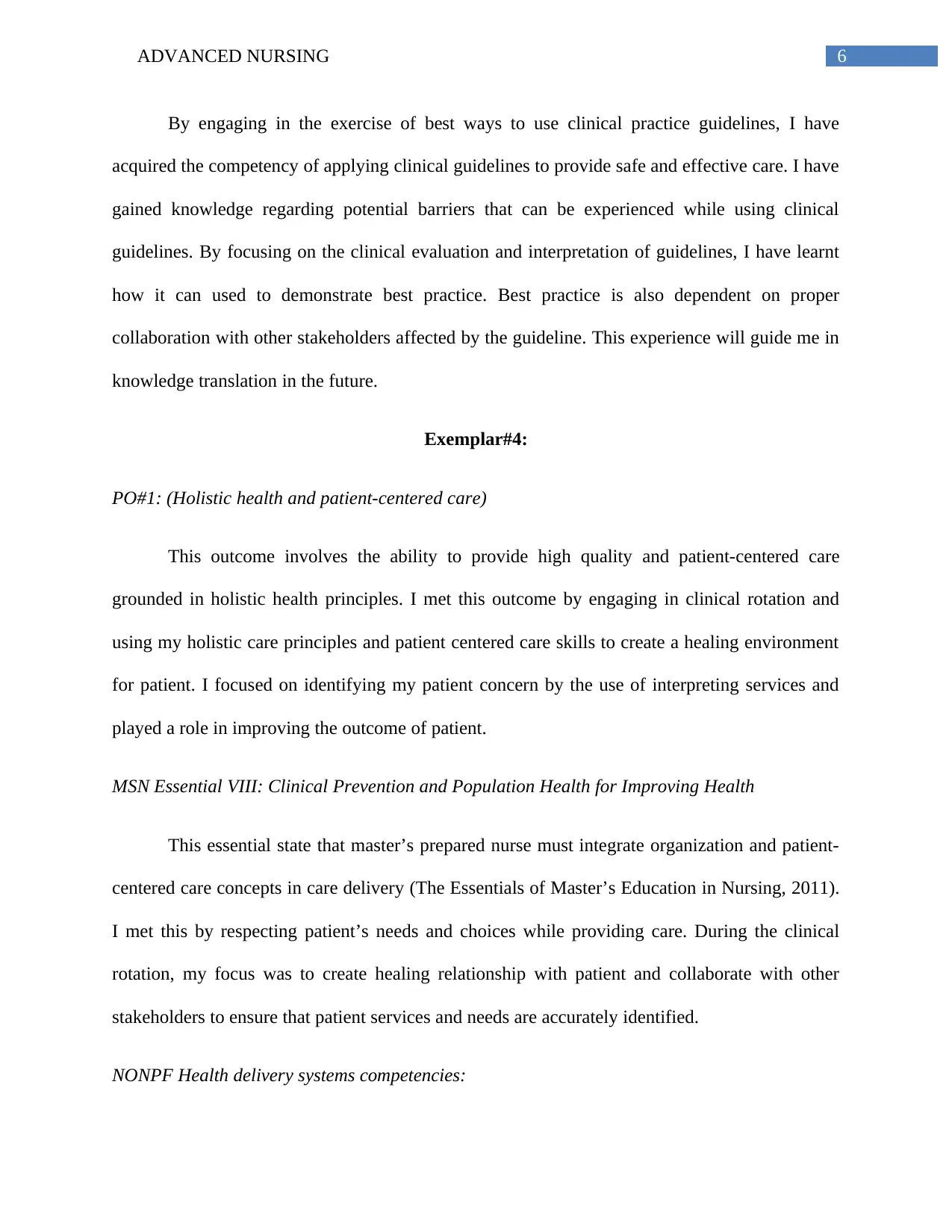
6ADVANCED NURSING
By engaging in the exercise of best ways to use clinical practice guidelines, I have
acquired the competency of applying clinical guidelines to provide safe and effective care. I have
gained knowledge regarding potential barriers that can be experienced while using clinical
guidelines. By focusing on the clinical evaluation and interpretation of guidelines, I have learnt
how it can used to demonstrate best practice. Best practice is also dependent on proper
collaboration with other stakeholders affected by the guideline. This experience will guide me in
knowledge translation in the future.
Exemplar#4:
PO#1: (Holistic health and patient-centered care)
This outcome involves the ability to provide high quality and patient-centered care
grounded in holistic health principles. I met this outcome by engaging in clinical rotation and
using my holistic care principles and patient centered care skills to create a healing environment
for patient. I focused on identifying my patient concern by the use of interpreting services and
played a role in improving the outcome of patient.
MSN Essential VIII: Clinical Prevention and Population Health for Improving Health
This essential state that master’s prepared nurse must integrate organization and patient-
centered care concepts in care delivery (The Essentials of Master’s Education in Nursing, 2011).
I met this by respecting patient’s needs and choices while providing care. During the clinical
rotation, my focus was to create healing relationship with patient and collaborate with other
stakeholders to ensure that patient services and needs are accurately identified.
NONPF Health delivery systems competencies:
By engaging in the exercise of best ways to use clinical practice guidelines, I have
acquired the competency of applying clinical guidelines to provide safe and effective care. I have
gained knowledge regarding potential barriers that can be experienced while using clinical
guidelines. By focusing on the clinical evaluation and interpretation of guidelines, I have learnt
how it can used to demonstrate best practice. Best practice is also dependent on proper
collaboration with other stakeholders affected by the guideline. This experience will guide me in
knowledge translation in the future.
Exemplar#4:
PO#1: (Holistic health and patient-centered care)
This outcome involves the ability to provide high quality and patient-centered care
grounded in holistic health principles. I met this outcome by engaging in clinical rotation and
using my holistic care principles and patient centered care skills to create a healing environment
for patient. I focused on identifying my patient concern by the use of interpreting services and
played a role in improving the outcome of patient.
MSN Essential VIII: Clinical Prevention and Population Health for Improving Health
This essential state that master’s prepared nurse must integrate organization and patient-
centered care concepts in care delivery (The Essentials of Master’s Education in Nursing, 2011).
I met this by respecting patient’s needs and choices while providing care. During the clinical
rotation, my focus was to create healing relationship with patient and collaborate with other
stakeholders to ensure that patient services and needs are accurately identified.
NONPF Health delivery systems competencies:
Paraphrase This Document
Need a fresh take? Get an instant paraphrase of this document with our AI Paraphraser
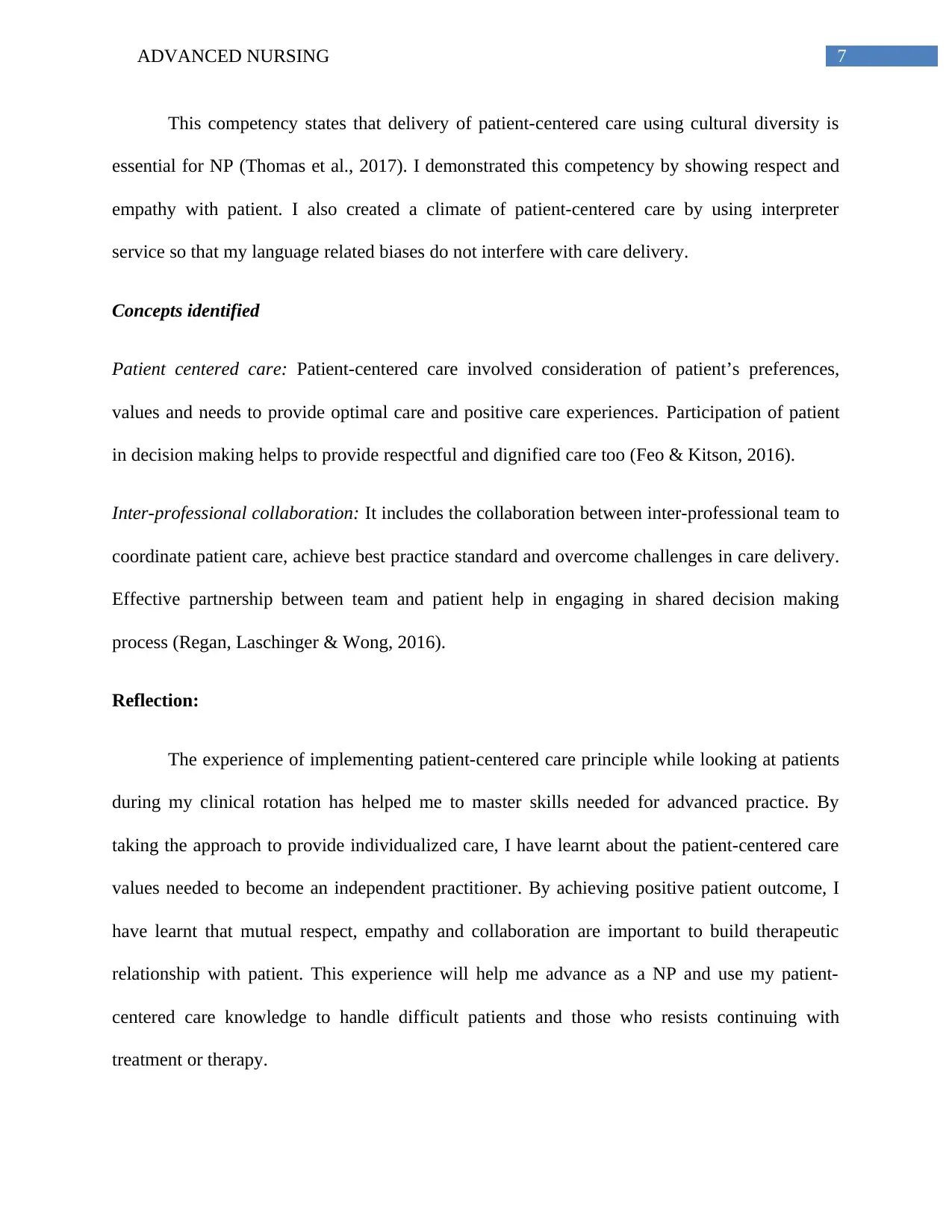
7ADVANCED NURSING
This competency states that delivery of patient-centered care using cultural diversity is
essential for NP (Thomas et al., 2017). I demonstrated this competency by showing respect and
empathy with patient. I also created a climate of patient-centered care by using interpreter
service so that my language related biases do not interfere with care delivery.
Concepts identified
Patient centered care: Patient-centered care involved consideration of patient’s preferences,
values and needs to provide optimal care and positive care experiences. Participation of patient
in decision making helps to provide respectful and dignified care too (Feo & Kitson, 2016).
Inter-professional collaboration: It includes the collaboration between inter-professional team to
coordinate patient care, achieve best practice standard and overcome challenges in care delivery.
Effective partnership between team and patient help in engaging in shared decision making
process (Regan, Laschinger & Wong, 2016).
Reflection:
The experience of implementing patient-centered care principle while looking at patients
during my clinical rotation has helped me to master skills needed for advanced practice. By
taking the approach to provide individualized care, I have learnt about the patient-centered care
values needed to become an independent practitioner. By achieving positive patient outcome, I
have learnt that mutual respect, empathy and collaboration are important to build therapeutic
relationship with patient. This experience will help me advance as a NP and use my patient-
centered care knowledge to handle difficult patients and those who resists continuing with
treatment or therapy.
This competency states that delivery of patient-centered care using cultural diversity is
essential for NP (Thomas et al., 2017). I demonstrated this competency by showing respect and
empathy with patient. I also created a climate of patient-centered care by using interpreter
service so that my language related biases do not interfere with care delivery.
Concepts identified
Patient centered care: Patient-centered care involved consideration of patient’s preferences,
values and needs to provide optimal care and positive care experiences. Participation of patient
in decision making helps to provide respectful and dignified care too (Feo & Kitson, 2016).
Inter-professional collaboration: It includes the collaboration between inter-professional team to
coordinate patient care, achieve best practice standard and overcome challenges in care delivery.
Effective partnership between team and patient help in engaging in shared decision making
process (Regan, Laschinger & Wong, 2016).
Reflection:
The experience of implementing patient-centered care principle while looking at patients
during my clinical rotation has helped me to master skills needed for advanced practice. By
taking the approach to provide individualized care, I have learnt about the patient-centered care
values needed to become an independent practitioner. By achieving positive patient outcome, I
have learnt that mutual respect, empathy and collaboration are important to build therapeutic
relationship with patient. This experience will help me advance as a NP and use my patient-
centered care knowledge to handle difficult patients and those who resists continuing with
treatment or therapy.
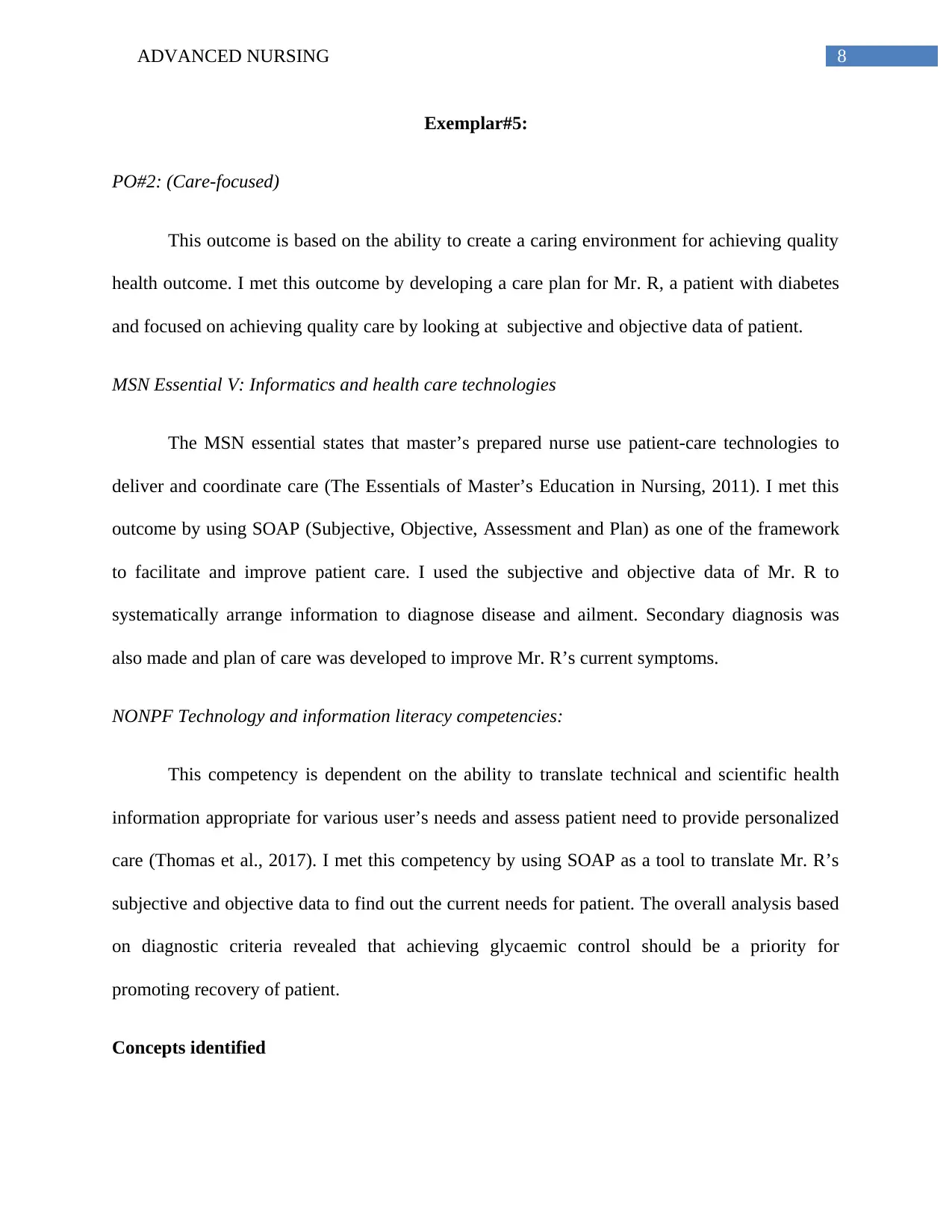
8ADVANCED NURSING
Exemplar#5:
PO#2: (Care-focused)
This outcome is based on the ability to create a caring environment for achieving quality
health outcome. I met this outcome by developing a care plan for Mr. R, a patient with diabetes
and focused on achieving quality care by looking at subjective and objective data of patient.
MSN Essential V: Informatics and health care technologies
The MSN essential states that master’s prepared nurse use patient-care technologies to
deliver and coordinate care (The Essentials of Master’s Education in Nursing, 2011). I met this
outcome by using SOAP (Subjective, Objective, Assessment and Plan) as one of the framework
to facilitate and improve patient care. I used the subjective and objective data of Mr. R to
systematically arrange information to diagnose disease and ailment. Secondary diagnosis was
also made and plan of care was developed to improve Mr. R’s current symptoms.
NONPF Technology and information literacy competencies:
This competency is dependent on the ability to translate technical and scientific health
information appropriate for various user’s needs and assess patient need to provide personalized
care (Thomas et al., 2017). I met this competency by using SOAP as a tool to translate Mr. R’s
subjective and objective data to find out the current needs for patient. The overall analysis based
on diagnostic criteria revealed that achieving glycaemic control should be a priority for
promoting recovery of patient.
Concepts identified
Exemplar#5:
PO#2: (Care-focused)
This outcome is based on the ability to create a caring environment for achieving quality
health outcome. I met this outcome by developing a care plan for Mr. R, a patient with diabetes
and focused on achieving quality care by looking at subjective and objective data of patient.
MSN Essential V: Informatics and health care technologies
The MSN essential states that master’s prepared nurse use patient-care technologies to
deliver and coordinate care (The Essentials of Master’s Education in Nursing, 2011). I met this
outcome by using SOAP (Subjective, Objective, Assessment and Plan) as one of the framework
to facilitate and improve patient care. I used the subjective and objective data of Mr. R to
systematically arrange information to diagnose disease and ailment. Secondary diagnosis was
also made and plan of care was developed to improve Mr. R’s current symptoms.
NONPF Technology and information literacy competencies:
This competency is dependent on the ability to translate technical and scientific health
information appropriate for various user’s needs and assess patient need to provide personalized
care (Thomas et al., 2017). I met this competency by using SOAP as a tool to translate Mr. R’s
subjective and objective data to find out the current needs for patient. The overall analysis based
on diagnostic criteria revealed that achieving glycaemic control should be a priority for
promoting recovery of patient.
Concepts identified
⊘ This is a preview!⊘
Do you want full access?
Subscribe today to unlock all pages.

Trusted by 1+ million students worldwide
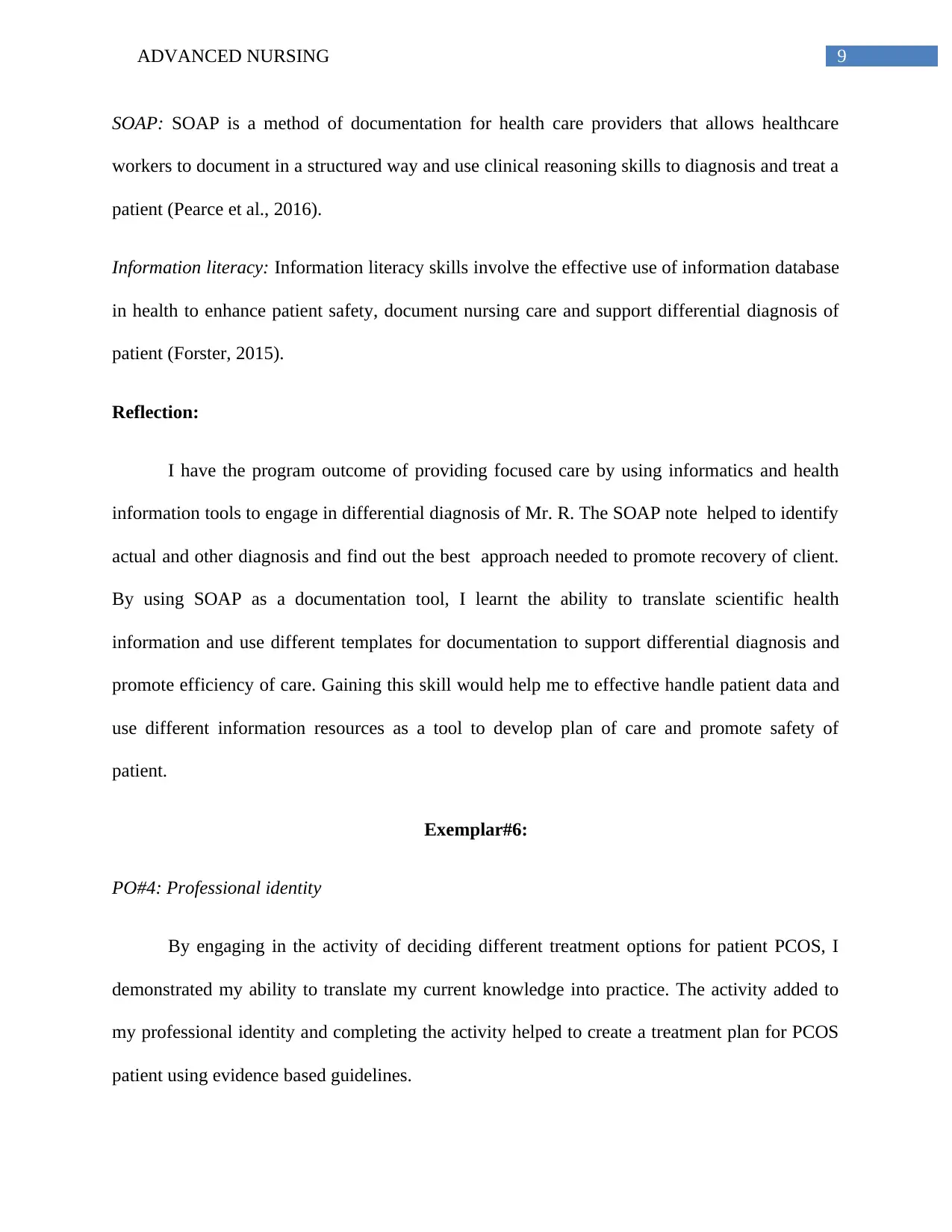
9ADVANCED NURSING
SOAP: SOAP is a method of documentation for health care providers that allows healthcare
workers to document in a structured way and use clinical reasoning skills to diagnosis and treat a
patient (Pearce et al., 2016).
Information literacy: Information literacy skills involve the effective use of information database
in health to enhance patient safety, document nursing care and support differential diagnosis of
patient (Forster, 2015).
Reflection:
I have the program outcome of providing focused care by using informatics and health
information tools to engage in differential diagnosis of Mr. R. The SOAP note helped to identify
actual and other diagnosis and find out the best approach needed to promote recovery of client.
By using SOAP as a documentation tool, I learnt the ability to translate scientific health
information and use different templates for documentation to support differential diagnosis and
promote efficiency of care. Gaining this skill would help me to effective handle patient data and
use different information resources as a tool to develop plan of care and promote safety of
patient.
Exemplar#6:
PO#4: Professional identity
By engaging in the activity of deciding different treatment options for patient PCOS, I
demonstrated my ability to translate my current knowledge into practice. The activity added to
my professional identity and completing the activity helped to create a treatment plan for PCOS
patient using evidence based guidelines.
SOAP: SOAP is a method of documentation for health care providers that allows healthcare
workers to document in a structured way and use clinical reasoning skills to diagnosis and treat a
patient (Pearce et al., 2016).
Information literacy: Information literacy skills involve the effective use of information database
in health to enhance patient safety, document nursing care and support differential diagnosis of
patient (Forster, 2015).
Reflection:
I have the program outcome of providing focused care by using informatics and health
information tools to engage in differential diagnosis of Mr. R. The SOAP note helped to identify
actual and other diagnosis and find out the best approach needed to promote recovery of client.
By using SOAP as a documentation tool, I learnt the ability to translate scientific health
information and use different templates for documentation to support differential diagnosis and
promote efficiency of care. Gaining this skill would help me to effective handle patient data and
use different information resources as a tool to develop plan of care and promote safety of
patient.
Exemplar#6:
PO#4: Professional identity
By engaging in the activity of deciding different treatment options for patient PCOS, I
demonstrated my ability to translate my current knowledge into practice. The activity added to
my professional identity and completing the activity helped to create a treatment plan for PCOS
patient using evidence based guidelines.
Paraphrase This Document
Need a fresh take? Get an instant paraphrase of this document with our AI Paraphraser
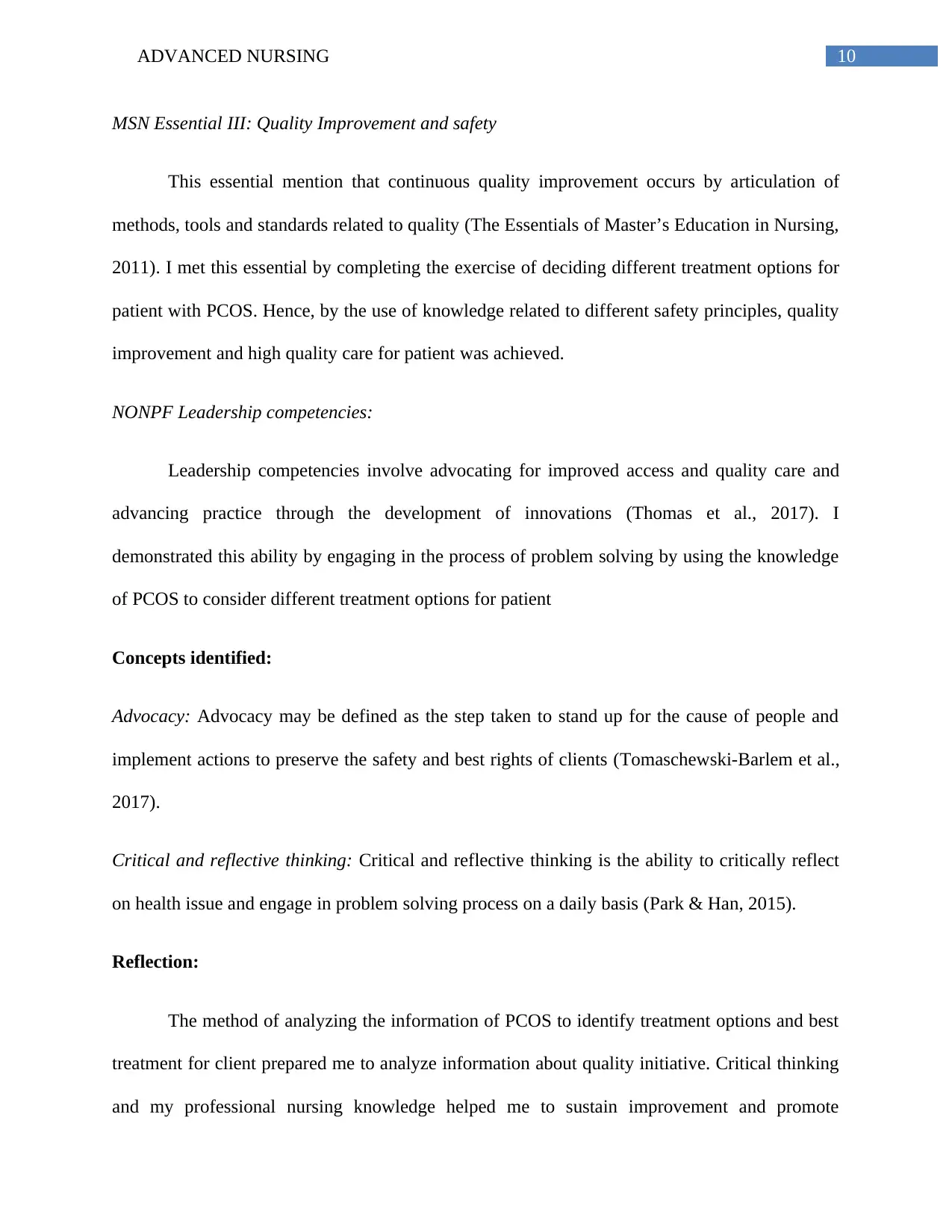
10ADVANCED NURSING
MSN Essential III: Quality Improvement and safety
This essential mention that continuous quality improvement occurs by articulation of
methods, tools and standards related to quality (The Essentials of Master’s Education in Nursing,
2011). I met this essential by completing the exercise of deciding different treatment options for
patient with PCOS. Hence, by the use of knowledge related to different safety principles, quality
improvement and high quality care for patient was achieved.
NONPF Leadership competencies:
Leadership competencies involve advocating for improved access and quality care and
advancing practice through the development of innovations (Thomas et al., 2017). I
demonstrated this ability by engaging in the process of problem solving by using the knowledge
of PCOS to consider different treatment options for patient
Concepts identified:
Advocacy: Advocacy may be defined as the step taken to stand up for the cause of people and
implement actions to preserve the safety and best rights of clients (Tomaschewski-Barlem et al.,
2017).
Critical and reflective thinking: Critical and reflective thinking is the ability to critically reflect
on health issue and engage in problem solving process on a daily basis (Park & Han, 2015).
Reflection:
The method of analyzing the information of PCOS to identify treatment options and best
treatment for client prepared me to analyze information about quality initiative. Critical thinking
and my professional nursing knowledge helped me to sustain improvement and promote
MSN Essential III: Quality Improvement and safety
This essential mention that continuous quality improvement occurs by articulation of
methods, tools and standards related to quality (The Essentials of Master’s Education in Nursing,
2011). I met this essential by completing the exercise of deciding different treatment options for
patient with PCOS. Hence, by the use of knowledge related to different safety principles, quality
improvement and high quality care for patient was achieved.
NONPF Leadership competencies:
Leadership competencies involve advocating for improved access and quality care and
advancing practice through the development of innovations (Thomas et al., 2017). I
demonstrated this ability by engaging in the process of problem solving by using the knowledge
of PCOS to consider different treatment options for patient
Concepts identified:
Advocacy: Advocacy may be defined as the step taken to stand up for the cause of people and
implement actions to preserve the safety and best rights of clients (Tomaschewski-Barlem et al.,
2017).
Critical and reflective thinking: Critical and reflective thinking is the ability to critically reflect
on health issue and engage in problem solving process on a daily basis (Park & Han, 2015).
Reflection:
The method of analyzing the information of PCOS to identify treatment options and best
treatment for client prepared me to analyze information about quality initiative. Critical thinking
and my professional nursing knowledge helped me to sustain improvement and promote
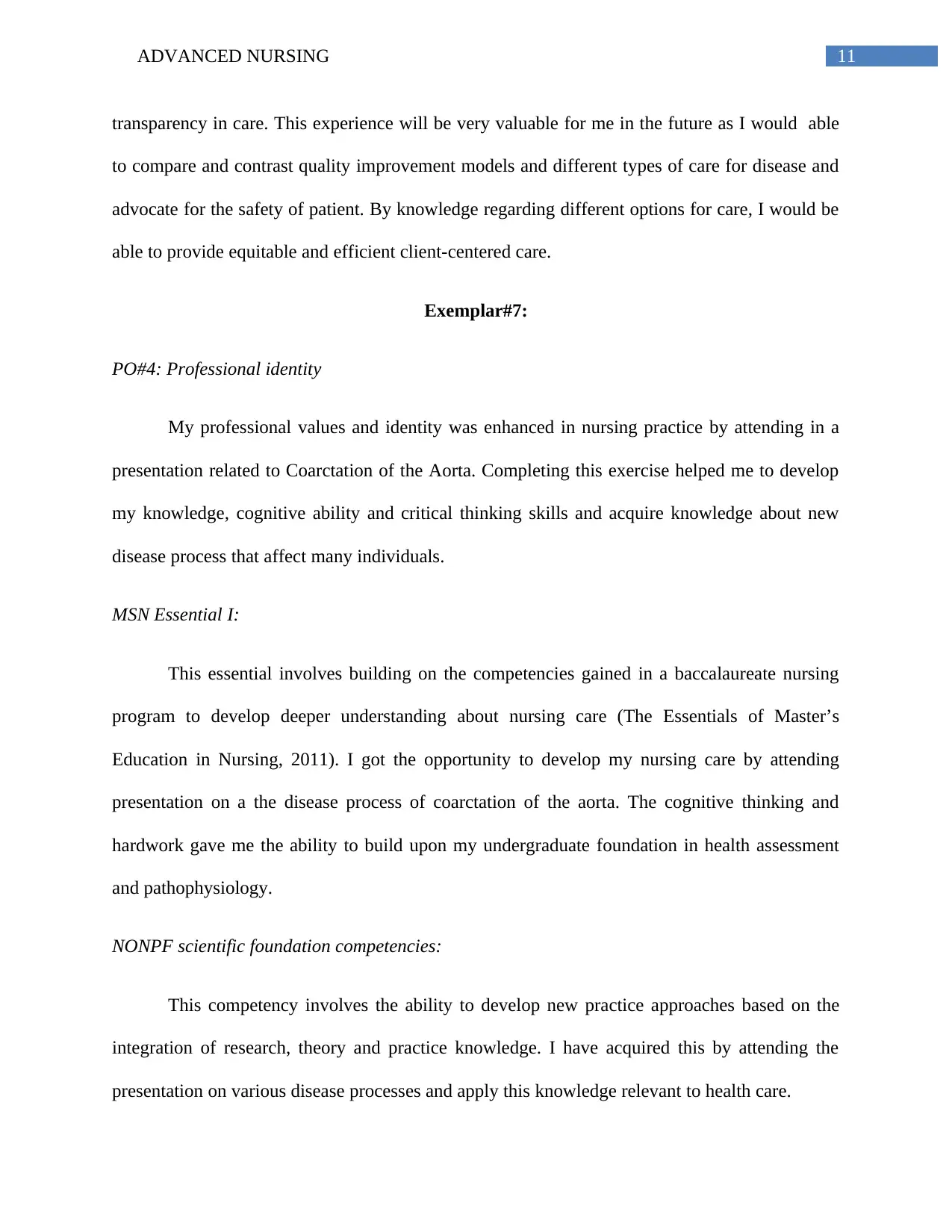
11ADVANCED NURSING
transparency in care. This experience will be very valuable for me in the future as I would able
to compare and contrast quality improvement models and different types of care for disease and
advocate for the safety of patient. By knowledge regarding different options for care, I would be
able to provide equitable and efficient client-centered care.
Exemplar#7:
PO#4: Professional identity
My professional values and identity was enhanced in nursing practice by attending in a
presentation related to Coarctation of the Aorta. Completing this exercise helped me to develop
my knowledge, cognitive ability and critical thinking skills and acquire knowledge about new
disease process that affect many individuals.
MSN Essential I:
This essential involves building on the competencies gained in a baccalaureate nursing
program to develop deeper understanding about nursing care (The Essentials of Master’s
Education in Nursing, 2011). I got the opportunity to develop my nursing care by attending
presentation on a the disease process of coarctation of the aorta. The cognitive thinking and
hardwork gave me the ability to build upon my undergraduate foundation in health assessment
and pathophysiology.
NONPF scientific foundation competencies:
This competency involves the ability to develop new practice approaches based on the
integration of research, theory and practice knowledge. I have acquired this by attending the
presentation on various disease processes and apply this knowledge relevant to health care.
transparency in care. This experience will be very valuable for me in the future as I would able
to compare and contrast quality improvement models and different types of care for disease and
advocate for the safety of patient. By knowledge regarding different options for care, I would be
able to provide equitable and efficient client-centered care.
Exemplar#7:
PO#4: Professional identity
My professional values and identity was enhanced in nursing practice by attending in a
presentation related to Coarctation of the Aorta. Completing this exercise helped me to develop
my knowledge, cognitive ability and critical thinking skills and acquire knowledge about new
disease process that affect many individuals.
MSN Essential I:
This essential involves building on the competencies gained in a baccalaureate nursing
program to develop deeper understanding about nursing care (The Essentials of Master’s
Education in Nursing, 2011). I got the opportunity to develop my nursing care by attending
presentation on a the disease process of coarctation of the aorta. The cognitive thinking and
hardwork gave me the ability to build upon my undergraduate foundation in health assessment
and pathophysiology.
NONPF scientific foundation competencies:
This competency involves the ability to develop new practice approaches based on the
integration of research, theory and practice knowledge. I have acquired this by attending the
presentation on various disease processes and apply this knowledge relevant to health care.
⊘ This is a preview!⊘
Do you want full access?
Subscribe today to unlock all pages.

Trusted by 1+ million students worldwide
1 out of 23
Your All-in-One AI-Powered Toolkit for Academic Success.
+13062052269
info@desklib.com
Available 24*7 on WhatsApp / Email
![[object Object]](/_next/static/media/star-bottom.7253800d.svg)
Unlock your academic potential
Copyright © 2020–2026 A2Z Services. All Rights Reserved. Developed and managed by ZUCOL.